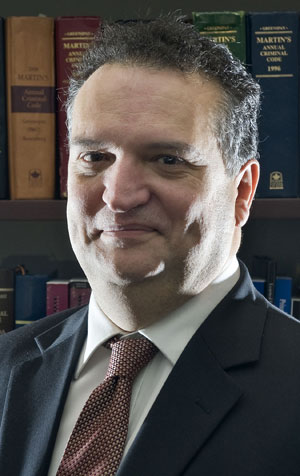The Ministry of the Attorney General should cover the cost of mental-health treatment for Crown attorneys whose condition was due to work-related stress, according to former Crown counsel.

As prosecutions get more complex with more voluminous evidence to sift through than ever before, Ontario’s Crown attorneys are under increased stress, according to lawyers who’ve now made the switch from prosecution to defence work. “Situations arise where emergency treatment is needed, and if it’s not covered, it should be,” says Anthony Moustacalis, a former Crown and now president of the Criminal Lawyers’ Association.
The comments follow news that the former president of the Ontario Crown Attorneys’ Association resigned over his controversial payment of rehabilitation costs for an assistant Crown attorney using the organization’s credit card.
According to documents obtained by
Law Times, Scott Rogers paid $20,000 to a medical facility for the care of an association member who showed visible signs of alcoholism, including “troubling behaviour in the work environment,” and disappeared for three days.
The assistant Crown attorney — who was “in the danger zone,” according to the documents — had participated in a contested bail hearing in which the accused got out of jail and murdered someone, the documents show.
In his resignation letter, Rogers said he was wrong for not discussing the issue with the board but didn’t apologize for the payment itself.
“Regarding the expenditure of association funds on urgently required medical treatment, I believe I made the correct decision,” he wrote in a letter to members.
“But I improperly deprived the board of the opportunity to make that decision. It was the board’s decision to make, not mine.”
He continued: “Given what we are called upon to do every day, such emergency circumstances are not going away. There is a massive, untenable gap here in our benefits coverage.”
During the October 2013 board meeting, Rogers told his colleagues he didn’t go to them at the time for confidentiality reasons. He also said he believed the ministry should cover the costs because “it was a workplace issue and the government’s moral responsibility.”
The minutes of a board of directors meeting suggests Rogers had considered “what happened” to another Crown attorney who died in the middle of a high-profile inquest.
For Crown attorneys, whose job has always involved dealing with difficult and tragic cases, the work has become tougher with the increased use of scientific and wiretap evidence. “The fact of it is that you see an increase in the amount of evidence. It puts a lot of stress on the Crown system and the defence side as well,” says Moustacalis.
Unless an existing health-care benefits package covers it, Moustacalis agrees the government should take care of costs associated with mental-health treatment for Crowns.
According to the minutes of the meeting the association’s board of directors held on the rehabilitation matter, Rogers suggested the government had previously helped cover a Crown’s treatment. But the ministry declined to say whether it had in fact done so.
“With respect to treatment for mental-health issues, the ministry does not comment on matters pertaining to individual employees,” said ministry spokesman Brendan Crawley.
But Crawley said the ministry takes mental illness seriously. “The ministry is committed to the health and well-being of Crown attorneys and all employees, and provides a range of benefits, programs, and services intended to maintain their health and wellness, including their mental health,” he said.
“Wellness has been a recurring theme and topic of formal discussion at annual continuing professional development conferences for all Crowns across the province,” Crawley added.
According to Moustacalis, the issue of mental illness among Crown attorneys came into focus in the 1980s after a senior prosecutor, Frank Hoffman, committed suicide.
“That incident brought the issue of mental health of employees to the fore,” says Moustacalis.
Other former Crowns agree the work can be stressful. Before he became a criminal defence lawyer, Calvin Barry worked 70 hours a week as a prosecutor. Before he left the Crown attorney’s office in 2004, he also served as the treasurer of the association.
In terms of mental-health resources, “there wasn’t a heck of a lot” at the time, he says. To cope with the stress of prosecuting murders, he used to run.
“You just had to try to cope. There were periods when people were getting burnt out. It’s something that the government probably has to have a look at: what they can do to make sure that there is no burnout and people are able to cope with issues that occur when you’re doing that kind of high-stress, high-tension work,” he says.
Rogers declined to speak to
Law Times, as did Scott Childs, the current president of the association.
Childs did say, however, that the $20,000 has now been repaid in full but didn’t indicate by whom. The documents
Law Times obtained indicate Rogers paid $10,000.

 As prosecutions get more complex with more voluminous evidence to sift through than ever before, Ontario’s Crown attorneys are under increased stress, according to lawyers who’ve now made the switch from prosecution to defence work. “Situations arise where emergency treatment is needed, and if it’s not covered, it should be,” says Anthony Moustacalis, a former Crown and now president of the Criminal Lawyers’ Association.
As prosecutions get more complex with more voluminous evidence to sift through than ever before, Ontario’s Crown attorneys are under increased stress, according to lawyers who’ve now made the switch from prosecution to defence work. “Situations arise where emergency treatment is needed, and if it’s not covered, it should be,” says Anthony Moustacalis, a former Crown and now president of the Criminal Lawyers’ Association.